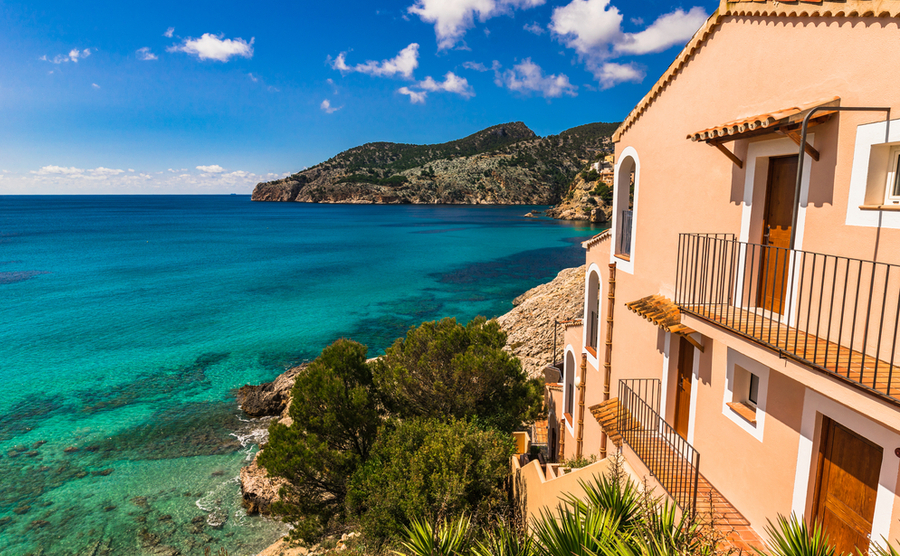Spain draws in British property buyers year after year. Some are looking to work or retire there, while others want a holiday or investment property. While we have lots of useful information on buying a property in Spain, in this article, we will look at renting before you buy.
If you already know exactly where you want to live, possibly because you have visited the area or have friends and relatives there, then going straight into purchasing your home is a good way to go. However, for those of you who aren’t fixed on a particular town or region, renting a place to suss out the area is an excellent start. Living in a place is very different from holidaying there. By renting before you buy, you could figure out if you love an area enough to buy there. It might well be that you’d like to rent in a few areas before you settle on your absolute favourite, the place of your future home.
There are different ways of renting in Spain and several new laws have recently been passed affecting all types of rentals, some national and others regional.
Find homes in Spain via our property portal.
Spain’s regions
Just to remind you, Spain has seventeen autonomous regions, each self-governing to a great extent. This means that they have wide powers to oversee policing, education and also housing laws.
Meanwhile, the national Government in Madrid, also has the authority to update and change housing laws. In each case, the results depend very much on which political party is in power. Local elections in Spain are held every four years: in fact, as I write this today on 28 May, I have just voted for my town’s mayor and counsellors. Later this year will see a General Election. There are also regional elections for regional governments.
NB: Prime Minister Pedro Sanchéz of the PSOE political party (socialist) has just announced a snap General Election for July following disappointing results in yesterday’s local elections.
Housing, tourist rentals and long-term rentals are all in the eyes of the various authorities. For those of you who want to spend a relatively short time renting before buying, you will most likely have to go down the tourist rental route.
Tourist rentals

A stay of at least three months will give you the chance to get a real feel for the area, beyond simply holidaying there.
In recent years illegal rentals to tourists have been heavily stamped down on. Now, owners are required to apply for a tourist licence. The rules vary from region to region but these days they are quite strict, with the aim of providing good accommodation and facilities.
There is a problem with tourist rentals, however, as locals are finding an ever reducing stock of homes to rent long-term and tourists are paying a lot more rent than a local can reasonably afford. (The average wage in Spain was €2260 a month at the end of 2022 but in several regions it is, in fact, considerably lower).
As a result, regional governments are trying to reduce the number of tourist rentals in major cities and some popular tourist locations. This means that with less supply, prices will rise. If you plan to rent for three months or longer, you might be able to arrange a reduction in the monthly rent and in the popular resorts, rents will generally be cheaper out of season, October to April.
I would recommend a stay of three months to get to know the area. This will give you long enough to adjust to the way of life in Spain, as opposed to what it is like to just holiday there. You will also get a feel for the cost of living in your area. Plus, you can become familiar with where the local amenities are, such as medical centres, supermarkets, restaurants, and sport facilities. It is also a chance to get used to the climate – maybe the heat of southern Spain is lovely for a week or two, but you actually start to miss cooler weather. Note: climate change is happening, also in Spain.
While a shorter stay will give you a feel for the area, it is unlikely to offer real insight into the day-to-day life of a resident in Spain. Although, of course, it will be less expensive.
It is really advisable to look for a rental through an accredited agency. For one thing, you will need to sign a contract and most agencies will be able to provide one in English so that you completely understand what you are signing for. It’s tempting to chat to a local in the bar or in a shop who tells you he/she knows of a super place to rent, owned probably by a relative and the price might seem very reasonable but beware! It may not have a tourist licence and the contract may not be as it should be.
Long-term rentals
You might be surprised to learn that there is an increasing number of British and other nationalities opting to rent rather than buy. Often, this is because of work in the big cities or retired people don’t want to invest their capital in a property.
Having already mentioned the reducing number of places to rent owing to tourism, it is becoming harder to find quality long term rentals. This again, has brought about a race in prices, particularly after the Covid pandemic.
Data from February 2023 corresponds to Spain’s main property website Idealista, that found that there was a 1.5 percent rise in rental rates in January and a 0.4 percent increase in February. The average of €11.70/sqm a month to rent an apartment.
There are advantages to opting for long-term rentals, however, as there are laws in place to protect the tenant. In fact a brand new law just passed, goes further than ever before to ensure stability and contain rent increases, which can only be 2% in 2023 and 3% in 2024.
Furnished or unfurnished?

While it might be simpler to find a furnished property, using your own furnishings can make it feel more like home.
Many places for long-term rental come furnished or partly furnished. This can be convenient if you plan to stay for twelve months or so (twelve months being the minimum term) but if you fall in love with an apartment but don’t like some of the furniture this could be a disadvantage. If the owner has multiple properties, they may agree to removing it, but this is not always possible.
If you are planning on bringing your own furniture and appliances, you will definitely need to look for unfurnished property. By law though, a rental must have certain items such as a cooker, a sink, a complete bathroom, or shower room and so on. It is really worth hanging on for a place with decent outside space, especially in larger towns or cities. Twenty or more years’ ago, almost all apartments were built with balconies. But in recent times, the trend has been to include more internal space and this has led to a large number of properties having no balcony at all but mod cons and smart kitchens.
The climate in Spain demands that you have a balcony at the very least and better, a terrace. For that, you should look for a duplex or attic as usually they have more outside space than an apartment. Check the community rules and regulations.
Another thing to consider is whether there is a lift if you are renting an apartment, duplex or attic and don’t forget parking! Street parking is difficult as there are never enough places for all the residents. Most blocks built within the last twenty years will have underground parking but you will probably have to pay for a space over and above the cost of the rental. It’s worth it! Prices vary but are somewhere between €50 and €80 a month.
Renting a house
Houses and villas are also available for long-term rentals, in the suburbs and in popular resorts and urbanisations. The same rules apply here as with apartment rentals: check for decent outside space. Preferably, you will have parking space for more than one car. It is also important to find out the rules of the urbanisation, whether the property has passed health and safety rules concerning swimming pools. It’s also wise to look at public transport, some areas are well served, other are not.
If you have a family, find out which are the nearest schools to the rental property and go and visit them before you sign a contract. For those of you who will be working in a nearby town or city, have a look at public transport options.
Does a long-term rental feel like home?
Finally, does a long-term rental really feel like home? Well yes, if you have chosen a place you really like. I have been living in the same rental apartment since 2012, in August it will be eleven years. It is absolutely my home as it was unfurnished, and I have everything of mine around me. I have two outside areas, parking, a lift and good neighbours. Who could ask for more?













